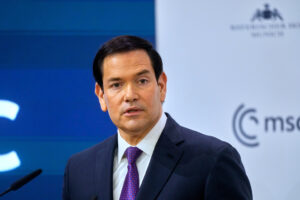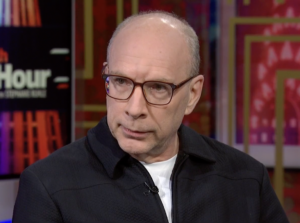Perspective | Women Made of Fire Cannot Be Burnt
I used to struggle with the idea that I might not be as connected to my Iranian heritage after coming out. As an Iranian-American, I am often asked by Iranians and Americans about “what it’s like” to be both, as if being queer in the United States does not bring its own set of anxieties. Some Iranians who emigrated to the United States in the wake of the 1979 Revolution assure us that, here, we can at least be queer. Can we?

Illustrated by Joanna Andreasson & New Lines
Since September 2022, I have been actively participating in New York-based protests in solidarity with the Iranian revolution’s fight against femicide and struggle for justice and equality. During one of these marches, I found myself face-to-face with an individual I had previously seen in a viral video, bravely cutting their hair just as I had done. This symbolic act of defiance has been adopted by Iranian feminists as a powerful message to the Islamic Republic: “[You] are losing a part of [your]existence, I am also losing a part of my existence with my own hands because of the tyrannical government.”
When I introduced my girlfriend to this protester, they surprised us with their response, “No way, I’m also queer.” Until that moment, I had never been around another openly queer Iranian. It was a revelation for me to discover that there are more individuals like us. When I shared my astonishment with them, they pointed to a few others they knew at the protest, and at that moment, I was overcome with tears of relief and a profound sense of solidarity.
I used to struggle with the idea that I might not be as connected to my Iranian heritage after coming out. As an Iranian-American, I am often asked by Iranians and Americans about “what it’s like” to be both, as if being queer in the United States does not bring its own set of anxieties. Some Iranians who emigrated to the United States in the wake of the 1979 Revolution assure us that, here, we can at least be queer. Can we?
Their observation that Iran is relatively more homophobic should not diminish the experiences of queer women in the United States. Likewise, acknowledging that we may have more rights and acceptance in the United States should not delegitimize the significance of being queer in Iran. The challenging political climate in Iran should not be used to dismiss LGBTQ+ rights violations in the United States.

It is worth addressing that some may not be aware of the recent developments in the United States. For instance, since 2021, numerous state laws have not only banned but also criminalized gender-affirming healthcare, with some of these laws going into effect as recently as September 1st of this year. Some states, such as Florida and Arkansas, are trying to legislate us away.
Making an equivalence between the United States and Iran is an extreme comparison, but it is also an oversimplification to associate the United States solely with instances of perfect equality, justice, and legal redress.
At one of the protests in support of Iran, an Iranian protester did not so much ask as tell me why we, queer individuals, were making this about us and questioned whether this was really the right time to advocate for LGBTQ+ rights. They pointed at my protest sign adorned with a pride flag. I couldn’t help but ask them, “Am I not Iranian? Am I not a woman? I am queer. How is this not about us too?” It is not the responsibility of those of us in the diaspora to lead the revolution. Instead, our role is to amplify it. The assumption that advocating for LGBTQ+ rights at this time will distract from the ongoing struggle for women’s rights in Iran is unfounded. Within the LGBTQ+ community, there are numerous individuals who identify as women. And thus, promoting LGBTQ+ rights inherently advances the cause of women within the queer community.
The current moment, in fact, presents an opportune time to advocate for LGBTQ+ rights in Iran. In the published words of Suzanne Pharr, she writes, “To be a lesbian is to be perceived as someone who has stepped out of line, who has moved out of sexual/economic dependence on a male, who is woman-identified. A lesbian is perceived as someone who can live without a man, and who is therefore (however illogically) against men.” Homophobia is yet another means to reinforce sexist stereotypes that are often attached to gender. Supporting a more just Iran involves supporting queer Iranians.
When I first heard about the protests in New York, my immediate thought was to be there. I yearn to join the protesters in Iran and fight alongside them, but being that I am queer, I cannot. My outspoken support for the female Iranian revolutionaries and my advocacy for the inclusion of queer and trans people have led me to forfeit the option of returning under the current regime’s rule. In the eyes of the Islamic Republic’s law, my presence would mean arrest and the potential sentence of capital punishment.
That is why I find it so pressing to be as out as I can be here in the United States, where I have a right to protest without the looming threat of arrest or rape. The courage displayed by the protesters in Iran is something I hope I will never have to summon, but that does not mean the United States is a haven of justice and equality for queer people.
The Pride protests I attended this past June were not my first ones, but it was the very first time I was marching as an Iranian during Pride, not just as a lesbian. I owe this empowering experience to the fierce Iranians who I witnessed standing up for their rights back home. To express my solidarity, I wrote “Iranian Lesbians Exist” on my Pride flag. At the Dyke March, amidst thousands of protestors, I spotted a woman who, by all indications, appeared to be both queer and of Iranian descent, judging by her tattoo. As she read my sign and our eyes met, we gravitated toward each other and embraced. That day, she taught me the word “Queerooni,” meaning queer Irooni (Iranian), adding depth to our shared experience.
For too long, we have endured the flames ignited by oppressive governments, while they remain relatively unscathed by the sparks of our resistance. But no more. Together, we stand united in our battle against the patriarchal systems governing us. Whether it is the Islamic Republic’s ruthless enforcement of unjust laws, or the United States’ lawmakers crafting legislation that will intensely increase the frequency of suicide among LGBTQ+ individuals, the forces are closing in.
This marks not only the one-year anniversary of “Zan, Zendegi, Azadi” (translated as “Woman, Life, Freedom” and adopted from Kurdish feminist thought), the resounding cry that emerged during the protests in response to Jina Mahsa Amini’s death in Iran. It also signifies 43 long years of injustices under the Islamic Republic, without any meaningful redress. Furthermore, it represents over four decades during which we have confronted the injustices faced by the LGBTQ+ community in America. Nevertheless, within us, our ever-emboldened fight continues to burn brightly. Women made of fire cannot be burnt.

Aryana Goodarzi (she/they) is an Iranian-American queer feminist writer and a current master’s student at NYU. Their research explores how to classify sexual assault and rape as forms of sex discrimination under the law. They are the founder of a magazine called, “There Are No Queers in the Middle East,” aimed at recognizing and discussing the existence of queer SWANA (Southwest Asian and North African) and Middle Eastern women and nonbinary individuals. The magazine is available online at all times and will be in print in early 2024 in both English and Farsi.





